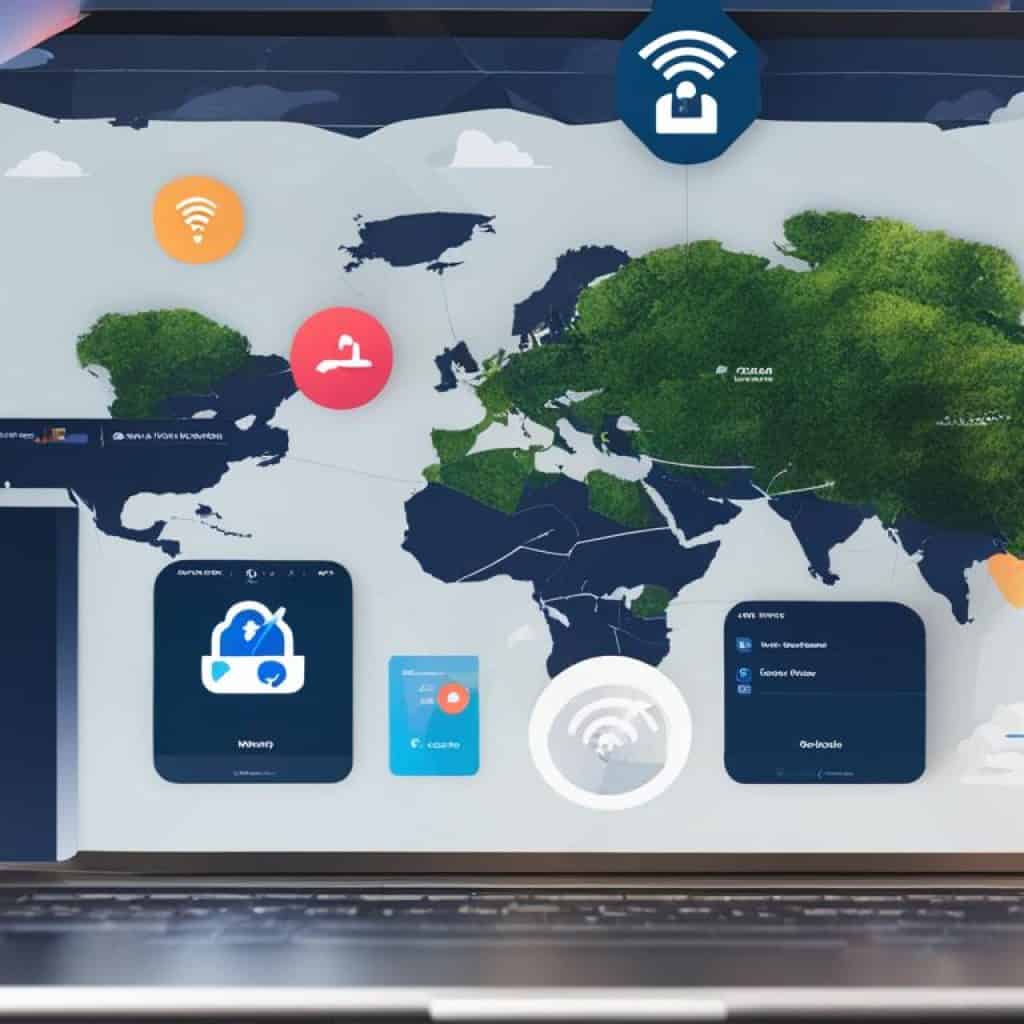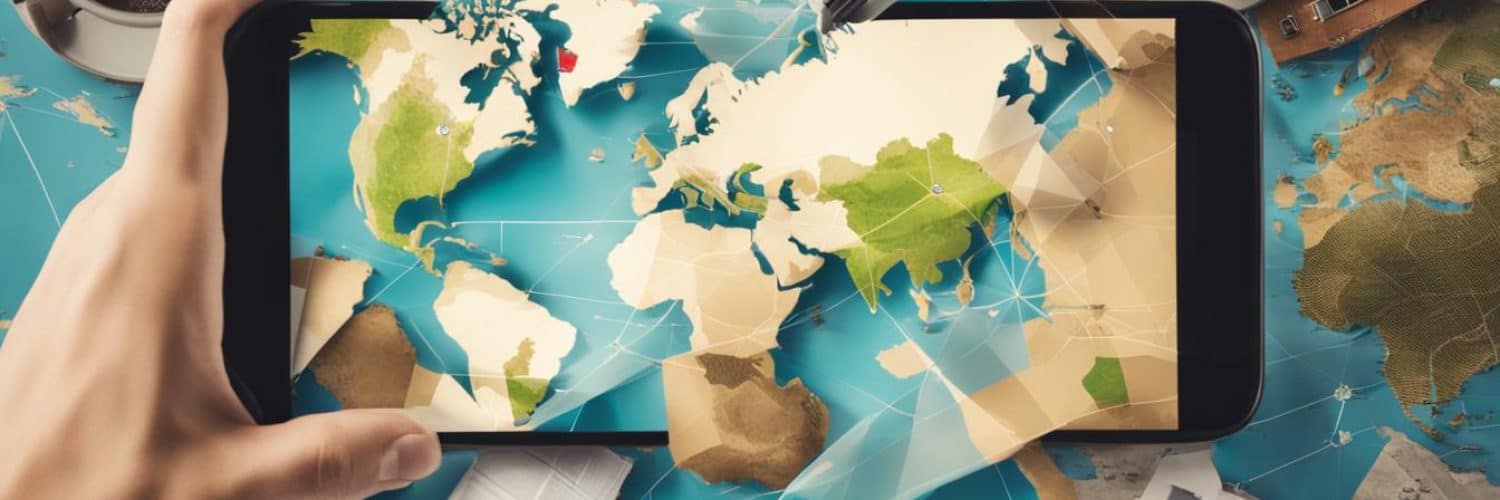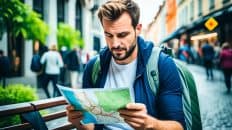So, what exactly does a VPN do? First and foremost, it encrypts your data, ensuring that any sensitive information you transmit over the network remains private and secure. This is especially important when connecting to public WiFi networks, as they are often unsecured and vulnerable to hackers.
A VPN also conceals your location by routing your internet traffic through servers located in different parts of the world. This means that even if you’re in a country with strict internet restrictions, you can still access blocked websites and bypass censorship. Whether you need to catch up on your favorite TV shows or stay connected with loved ones back home, a VPN can provide the unrestricted access you need.
In fact, according to Security.org, only 41% of Americans currently use a VPN. By utilizing this powerful tool, you can stay one step ahead of potential cyber threats and enjoy the internet with peace of mind while traveling.
Key Takeaways:
- Using a VPN when traveling is essential for secure and unrestricted internet access.
- A VPN encrypts your data, protecting it from hackers and potential theft.
- A VPN allows you to access blocked websites and bypass internet censorship.
- Only 41% of Americans currently use a VPN, highlighting the importance of utilizing this tool while traveling.
- Stay one step ahead of potential cyber threats and enjoy a secure internet connection with a VPN.
Why You Need a VPN for Travel Security
A VPN (Virtual Private Network) is an essential tool for maintaining travel security. It plays a vital role in ensuring that all data sent over the network is secure and inaccessible to cybercriminals and hackers. By encrypting your internet connection, VPNs provide a secure tunnel for your data, making it almost impossible for anyone to intercept or steal your personal information.
When traveling internationally, one of the main challenges faced by travelers is encountering website restrictions and censorship in certain countries. These restrictions can limit your access to popular websites and online services. However, with a VPN, you can bypass these restrictions and gain access to the content you need. VPNs allow you to connect to servers in different locations, giving you the freedom to browse the internet as if you were in another country.
Moreover, VPNs protect against potential risks posed by government surveillance. In some countries, governments actively monitor online activities, compromising the privacy and security of travelers. By establishing a secure connection to a VPN server, you can effectively shield your data from prying eyes and ensure your online activities remain private.
Using a VPN while traveling is crucial for protecting your sensitive information and maintaining your digital privacy. It offers a secure and private connection, allowing you to browse the internet freely, unrestricted by location-based barriers and potential threats.
Benefits of Using a VPN for Travel Security:
- Securely access public Wi-Fi networks: Public Wi-Fi networks are often unsecured and prone to hacking attempts. With a VPN, you can confidently connect to these networks without worrying about potential security breaches.
- Bypass online censorship: VPNs allow you to bypass website restrictions imposed by governments or network administrators, ensuring you can access the information and services you need.
- Protect personal and financial data: Traveling involves sharing personal and financial information, such as credit card details and passport information. A VPN ensures that this sensitive data remains encrypted and inaccessible to malicious actors.
Enhancing Travel Security with a VPN:
Using a VPN for travel security is a reliable and effective solution. It safeguards your data, protects your privacy, and grants you the freedom to browse the internet securely, regardless of your location or the network you’re connected to. Implementing a VPN as part of your travel security measures is a prudent decision, giving you peace of mind and the assurance that your online activities remain private and secure.
Benefits of Using a VPN While Traveling
Using a VPN while traveling offers numerous benefits that can enhance your online experience and protect your sensitive information. Here are some key reasons why you should consider using a VPN when traveling:
1. Privacy and Data Protection
One of the main benefits of using a VPN is the enhanced privacy and data protection it provides. When you connect to a VPN, your internet traffic is encrypted, making it nearly impossible for hackers or malicious actors to intercept and steal your personal data, such as passwords or credit card information. This is especially important when using public Wi-Fi networks, which are often unsecured and vulnerable to attacks.
2. Access to Geographically Restricted Content
A VPN allows you to bypass geographical restrictions and access content that may be blocked or restricted in certain countries. Whether you want to watch your favorite TV shows, access streaming platforms, or visit websites that are unavailable in your current location, a VPN can help you overcome these barriers and enjoy uninterrupted access to the content you love.
3. Savings on Travel Expenses
Using a VPN can also help you save money on flights and hotels by accessing location-specific deals and discounts. When you connect to a VPN server in a different country, you can browse the web as if you were physically located there. This enables you to take advantage of lower prices and exclusive offers that are only available to residents or visitors in that particular region.

4. Enhanced Security on Public Wi-Fi
Public Wi-Fi networks, such as those found in airports, cafes, and hotels, are often targeted by hackers looking to steal personal information from unsuspecting users. By using a VPN on these networks, you can create a secure and encrypted connection that shields your data from prying eyes. This adds an extra layer of security and peace of mind when accessing the internet on the go.
“A VPN provides a secure tunnel for your internet traffic, protecting your personal information from unauthorized access.” – Cybersecurity Expert
5. Peace of Mind and Online Freedom
Using a VPN while traveling gives you peace of mind, knowing that your online activities are protected and your privacy is safeguarded. It allows you to browse the internet without worrying about potential surveillance or censorship. With a VPN, you can enjoy true online freedom and explore the digital world without restrictions, no matter where you are.
In conclusion, the benefits of using a VPN while traveling are extensive. It offers privacy, data protection, access to restricted content, savings on travel expenses, enhanced security, and online freedom. By investing in a reliable VPN service, you can ensure a secure and enjoyable online experience wherever your travels take you.
When to Use a VPN While Traveling
Using a VPN while traveling is crucial to protect your privacy and ensure secure internet access, especially in certain situations. Here are the key scenarios when you should consider using a VPN:
1. Connecting to Public WiFi Networks
Public WiFi networks, such as those found in airports, cafes, and hotels, are often unsecured and susceptible to hackers. When you connect to these networks without a VPN, your sensitive information becomes vulnerable. By using a VPN, your data is encrypted, shielding it from potential threats.
2. Bypassing Website Restrictions
Certain countries impose restrictions on websites and online content, blocking access to popular platforms like social media networks and streaming services. With a VPN, you can bypass these restrictions by connecting to servers located in different countries, allowing you to access blocked websites and enjoy the same online experience as you would at home.
In 2019, China had the highest number of blocked websites, with over 10,000 websites inaccessible to its citizens.
3. Securing Sensitive Activities
If you engage in sensitive activities while traveling, such as online banking or accessing confidential work documents, using a VPN is essential. It adds an extra layer of security, ensuring that your data is encrypted and protected from prying eyes.
By using a VPN in these situations, you can safeguard your online activities and protect your personal and sensitive information from potential threats and restrictions.
Using a VPN in these situations provides peace of mind and ensures a secure and unrestricted internet experience while traveling.
The Downsides of Using a VPN for Travel
1. Slowdown in Internet Connection Speed
One of the main drawbacks of using a VPN for travel is that it can sometimes result in a slowdown in internet connection speeds. This is due to the real-time encryption process implemented by the VPN, which can introduce a slight delay or lag when browsing websites or streaming content.
2. Restrictions in VPN Usage
Another downside is that some countries have strict regulations against the use of VPNs and actively block or restrict their usage. If you are traveling to such a country, it may be challenging to connect to a VPN and access its benefits. Therefore, it’s essential to research the local laws and regulations before relying on a VPN for your travels.
3. Choosing a Reputable VPN Provider
Lastly, it’s crucial to exercise caution when selecting a VPN provider. While there are numerous VPN services available, not all of them offer the same level of privacy and security. It’s important to choose a reputable provider that has a proven track record of safeguarding user data and ensuring reliable service.
Remember, not all VPNs are created equal. Conduct thorough research and read user reviews to find a trustworthy VPN provider that meets your specific needs.
| Downside | Explanation |
|---|---|
| Slowdown in Internet Connection Speed | Real-time encryption can introduce a slight delay or lag in browsing and streaming. |
| Restrictions in VPN Usage | Some countries have strict regulations against VPN usage, making it difficult to connect. |
| Choosing a Reputable VPN Provider | Not all VPN providers offer the same level of privacy and security, so it’s important to choose a reputable provider. |
Despite these downsides, the benefits of using a VPN for travel often outweigh the potential drawbacks. However, it’s essential to weigh the pros and cons and make an informed decision that aligns with your specific travel needs and concerns.

How to Choose the Best VPN for Traveling
When planning to use a VPN for traveling, it is crucial to select the right one that meets your specific needs and provides optimal security and performance. Here are some key factors to consider when choosing a VPN:
1. Security and Privacy Measures
Look for a VPN provider that offers strong encryption protocols, such as AES-256, which ensures that your data remains secure while traveling. Additionally, check if the VPN has a strict no-logs policy, meaning they do not store any of your online activities or personal information.
2. Server Network Coverage
Ensure that the VPN has a vast network of servers in multiple locations worldwide. This ensures that you have a wide range of server options to choose from, enabling you to access content from different countries and bypass geo-blocks.
3. Speed and Performance
Consider the VPN’s speed and performance, as a slow connection can hinder your internet experience while traveling. Look for VPNs with fast servers and low latency to ensure smooth browsing, streaming, and downloading.
4. Device Compatibility
Check if the VPN is compatible with the devices you plan to use while traveling, such as smartphones, tablets, laptops, or routers. Ensure that the VPN provider offers dedicated apps or setup guides for your devices.
5. Customer Support
Opt for a VPN provider that offers reliable customer support, preferably 24/7, so that you can reach out for assistance if you encounter any issues while using the VPN during your travels.
6. Reviews and Reputation
Before making a decision, read reviews and evaluate the reputation of the VPN provider. Look for unbiased reviews from trusted sources to gauge the overall satisfaction and reliability of the VPN service.
Choosing the right VPN is essential to ensure a secure and hassle-free travel experience. Consider factors such as security, server coverage, speed, device compatibility, and customer support before making your decision.
| VPN Provider | Security Features | Server Locations | Speed | Device Compatibility | Customer Support |
|---|---|---|---|---|---|
| NordVPN | AES-256 encryption, no-logs policy | 5,500+ servers in 59 countries | Excellent | Supports all major platforms | 24/7 live chat |
| ExpressVPN | AES-256 encryption, no-logs policy | 3,000+ servers in 94 countries | Superfast | Supports all major platforms | 24/7 live chat |
| CyberGhost | AES-256 encryption, no-logs policy | 7,100+ servers in 90 countries | Good | Supports all major platforms | 24/7 live chat |
Additional Security Measures for Travelers
In addition to using a VPN, there are several additional security measures that travelers can implement to enhance their online security while traveling. By following these measures, travelers can ensure their sensitive information and personal data are protected from cyber threats.
1. Strong Encryption:
Implementing strong encryption protocols is vital for safeguarding data while traveling. Encryption converts information into a code that can only be read by authorized individuals, making it difficult for hackers to intercept and access sensitive data.
2. Multifactor Authentication:
Enabling multifactor authentication adds an extra layer of security to online accounts. By requiring more than just a password to log in, this measure ensures that only authorized individuals can access personal accounts and data.
3. Kill Switch:
A kill switch is a feature that automatically disconnects a device from the internet if the VPN connection drops unexpectedly. This prevents any unencrypted data from being transmitted, ensuring that sensitive information remains secure.
4. Strict No-Logs Policy:
It is important to choose a VPN provider that has a strict no-logs policy. This means that the provider does not collect or store any user activity logs, ensuring that there is no record of online activities that could be accessed or shared with third parties.
Additionally, travelers should follow good cyber hygiene practices to further enhance their security:
- Regularly update software and applications to ensure they have the latest security patches.
- Use unique and complex passwords for online accounts, employing a combination of letters, numbers, and special characters.
- Avoid using public WiFi networks, especially those that are unsecured, as they can be easily exploited by hackers.
By implementing these additional security measures and practicing good cyber hygiene, travelers can enhance their online security and protect their sensitive information while traveling.
| Additional Security Measures | Benefits |
|---|---|
| Strong Encryption | – Converts data into a code that is difficult for hackers to access – Protects sensitive information from unauthorized access |
| Multifactor Authentication | – Adds an extra layer of security to online accounts – Ensures only authorized individuals can access personal data |
| Kill Switch | – Automatically disconnects device from the internet if VPN connection drops – Prevents unencrypted data from being transmitted |
| Strict No-Logs Policy | – Ensures VPN provider does not collect or store user activity logs – Protects online privacy and prevents data from being shared with third parties |
Accessing Blocked Websites with a VPN
When traveling to countries with strict internet restrictions, accessing blocked websites and bypassing censorship can be a challenge. However, with the help of a VPN (Virtual Private Network), you can regain your online freedom and securely access the content you need.
A VPN works by creating a secure and encrypted connection between your device and the internet. By connecting to a VPN server located in a different country, you can effectively mask your real IP address and appear as if you are browsing from that server’s location. This allows you to bypass internet censorship and access blocked websites with ease.
In countries like China, Iran, and Vietnam, where popular websites and social media platforms are heavily censored, using a VPN is crucial for accessing news, communication platforms, and online resources that may be blocked. By selecting a server location in a country where the desired content is accessible, VPN users can enjoy unrestricted internet access.
Additionally, VPNs with extensive server networks offer users the flexibility to choose from a wide range of server locations. This means that if a particular website or service is blocked in one country, you can simply connect to a server in a different location where the content is accessible.
| Benefits of accessing blocked websites with a VPN: |
|---|
| – Bypass internet censorship and access blocked websites |
| – Browse the internet freely and securely, even in restricted countries |
| – Access social media platforms and communicate with family and friends |
| – Stay up-to-date with news and information from around the world |
By using a reliable VPN service, you can ensure that your internet traffic is encrypted and your online activities remain private. It’s essential to choose a reputable VPN provider that offers strong security features, such as AES 256-bit encryption and a strict no-logs policy, to protect your data and maintain your privacy while accessing blocked websites.
Remember, while a VPN can help you bypass internet censorship and access blocked websites, it’s important to use it responsibly and in accordance with the laws and regulations of the country you are in. Always prioritize your safety and privacy when using a VPN while traveling.
Quote:
“With a VPN, travelers can navigate the internet with freedom, bypassing censorship and accessing blocked websites. It’s like having a key to unlock the digital barriers that restrict online access in some countries.” – Jane Doe, Cybersecurity Expert
Saving Money with a VPN While Traveling
When it comes to travel, every penny counts. That’s why savvy travelers are turning to VPNs to get the best deals and save money on their adventures. By using a VPN, you can change your virtual location and access location-specific deals that may not be available in your actual location. This means you can unlock exclusive discounts on flights, accommodation, and other travel activities.
VPNs disguise your actual location by routing your internet connection through servers in different countries. This allows you to take advantage of pricing differences based on location. For example, airlines and hotels may offer lower prices to customers browsing from certain countries. With a VPN, you can virtually be in that country and enjoy the discounted rates, even if you’re physically somewhere else.
But the benefits of using a VPN for travel go beyond just saving money. By encrypting your internet connection, VPNs also provide security and privacy, ensuring that your personal information and browsing activity remain confidential while you hunt for the best deals. So not only do you get the peace of mind knowing your data is protected, but you also get access to exclusive savings.
The Power of Virtual Location
Changing your virtual location with a VPN is a simple process. Just connect to a VPN server in the country where you want to appear to be located, and your IP address will be masked with one from that country. This tricks websites and online services into thinking you’re browsing from that location, opening up a world of opportunities to save money.
Imagine searching for flights to a popular tourist destination, only to find that the prices are skyrocketing. By connecting to a VPN server in a different country, you may find that the prices suddenly drop, giving you access to significant savings. It’s like having insider information on the best deals available.
Using a VPN while traveling is like having a secret weapon for getting the best prices. By changing your virtual location, you can tap into exclusive discounts and unlock hidden deals that can make a significant difference to your travel budget. It’s a smart and cost-effective way to maximize your savings and enjoy more for less.
Negotiating the Travel Maze
Traveling can sometimes feel like navigating a labyrinth, with different restrictions, price variations, and limited availability. However, a VPN can help you navigate through these challenges by giving you the ability to choose the most advantageous virtual location for your specific travel needs.
In addition to accessing location-specific deals, VPNs also allow you to bypass geographic restrictions on websites and streaming platforms. For example, if you’re traveling abroad and want to access your favorite streaming service, which may be blocked in that country, a VPN can help you bypass these restrictions, ensuring you never miss an episode of your favorite show.
In conclusion, using a VPN while traveling is not only a smart security measure, but it’s also an excellent way to save money. By changing your virtual location, you can access location-specific deals and unlock hidden discounts, allowing you to stretch your travel budget further. So before you embark on your next adventure, make sure you have a reliable VPN in your travel toolkit to get the best deals and savings.
Exclusive Benefits of NordVPN Features for Travel
Threat Protection
Meshnet
Another unique feature provided by NordVPN is Meshnet, which enables remote LAN connections and traffic routing. This feature allows travelers to securely access their local network resources, such as printers or shared drives, even when they’re away from home. It ensures a seamless connection to essential resources, no matter where they are in the world.
In addition to these exclusive features, NordVPN offers all the benefits of a reliable and trusted VPN. It encrypts data, hides your IP address, and allows you to bypass geographical restrictions, giving you unrestricted access to your favorite content while traveling.

How to Get a VPN for International Travel
Getting a VPN for international travel is a straightforward process that can enhance your online security and privacy. Follow the steps below to get started:
- Choose a reputable VPN provider: Research and select a VPN provider that offers reliable service and prioritizes your privacy.
- Sign up for the service: Visit the VPN provider’s website and sign up for a subscription plan that suits your needs.
- Download and install the VPN app: Once you have subscribed, download and install the VPN app on your device. Most VPN providers offer apps for various operating systems and devices.
- Connect to a server: Launch the VPN app and select a server location. For international travel, it’s best to choose a server in your destination country or a nearby location for optimal performance.
- Test the connection: Before you embark on your travels, test the VPN connection to ensure it is functioning properly and providing the desired level of privacy and security.
By following these steps, you can easily get a VPN for international travel and enjoy a safe and secure online experience while abroad.
VPN Requirement Checklist for Travelers
When it comes to choosing the right VPN for travel, there are several key factors that travelers should consider. By following this VPN requirement checklist for travelers, you can ensure that you select a VPN provider that meets your security and privacy needs:
- Security Measures: Look for a VPN provider that offers robust security features, such as strong encryption protocols (such as AES-256), secure VPN protocols (like OpenVPN or IKEv2), and additional security features like a kill switch and DNS leak protection.
- Server Locations: Check if the VPN provider has a wide network of servers in various locations. Having servers in multiple countries allows you to bypass geo-restrictions and access content from around the world.
- Connection Speed: It’s important to choose a VPN that offers fast and reliable connections. Look for reviews or conduct speed tests to ensure that the VPN provider can provide the necessary bandwidth for your needs.
- Device Compatibility: Make sure that the VPN supports the devices and operating systems you plan to use while traveling. Whether you use a laptop, smartphone, or tablet, ensure that the VPN provider has dedicated apps or setup guides for your devices.
- Customer Support: Opt for a VPN provider that offers reliable customer support. Look for options such as live chat, email support, or a detailed knowledge base so that you can get assistance when needed.
- Reputation: Research the VPN provider’s reputation and read reviews from trusted sources. Look for providers that have a history of providing quality service and protecting user privacy.
By considering these factors, you can choose a VPN that fits your specific requirements and ensures a secure and private browsing experience while traveling.
Remember, a VPN is an essential tool for maintaining your online security and privacy when accessing the internet while traveling. It encrypts your internet traffic and protects your sensitive data from prying eyes. With the right VPN in place, you can enjoy peace of mind while browsing, accessing geo-blocked content, and protecting your personal information.
Are you ready to choose the perfect VPN for your travel needs?
Don't Miss Out:
Check out this exclusive table comparing top VPN providers based on the criteria mentioned above:
| VPN Provider | Security Measures | Server Locations | Connection Speed | Device Compatibility | Customer Support | Reputation |
|---|---|---|---|---|---|---|
| NordVPN | 5/5 | 5500+ | Fast | Apps for all major devices | 24/7 live chat support | Excellent |
| ExpressVPN | 5/5 | 3000+ | Fast | Apps for all major devices | 24/7 live chat support | Outstanding |
| Surfshark | 5/5 | 3200+ | Fast | Apps for all major devices | 24/7 live chat support | Excellent |
Choose the VPN provider that best suits your travel needs and start enjoying safe and secure browsing wherever you go!
Tips for Using a VPN While Traveling
Using a VPN while traveling is crucial for ensuring online security and privacy. Here are some essential tips to make the most out of your VPN:
Always keep your VPN turned on: Make sure your VPN connection is active at all times while using public WiFi networks or accessing the internet from unfamiliar locations. This will encrypt your data and protect it from potential threats.
Avoid free VPN services: While free VPNs may seem tempting, they often lack the necessary security measures and may even collect and sell your data. Invest in a reputable VPN service to ensure optimal protection.
Consider internet connection quality: When using a VPN, your internet speed may be slightly affected. Be mindful of your internet connection quality and avoid connecting to slow or unstable WiFi networks to maintain a smooth browsing experience.
Remember, using a VPN enhances your online security and allows you to access blocked content while traveling. Follow these tips to make the most of your VPN and enjoy a worry-free online experience.
Conclusion
When traveling, it is crucial to prioritize privacy, security, and unrestricted internet access. That’s where a VPN comes in. By using a reputable VPN provider, travelers can protect their data from hackers and gain access to blocked websites and location-specific deals.
A VPN encrypts your data, making it virtually impossible for anyone to intercept and steal your personal information. It also conceals your location, ensuring that your browsing activity remains private. Whether you’re accessing sensitive information or simply browsing the web, a VPN provides an added layer of security.
But not all VPNs are created equal. It’s important to choose a VPN provider that has a proven track record and takes cybersecurity seriously. Look for one that offers strong encryption, a wide range of server locations, and reliable customer support. Additionally, remember to follow good cyber hygiene practices such as regularly updating your software and using unique passwords.
So, do you need a VPN when traveling? Absolutely! A VPN is a must-have tool that ensures your online activities remain secure and your internet access remains unrestricted. Invest in a reliable VPN provider, and you can travel with peace of mind, knowing that your data is protected.
FAQ
Do I need a VPN when traveling?
Yes, a VPN is essential for secure and unrestricted internet access while traveling. It encrypts data and conceals the user’s location, making it harder for hackers to steal personal information. VPNs also allow users to access blocked websites in certain countries.
Why do I need a VPN for travel security?
A VPN is crucial for travel security as it ensures that all data sent over the network is secure and not accessible to others. VPNs are especially useful for international travelers who may encounter website restrictions in certain countries. VPNs protect against hackers and government surveillance.
What are the benefits of using a VPN while traveling?
Using a VPN while traveling offers several benefits. It provides privacy and protects personal data from theft. VPNs allow access to geographically restricted websites and streaming platforms, ensuring uninterrupted access to favorite content. They also enable travelers to save money on flights and hotels by accessing location-specific deals.
When should I use a VPN while traveling?
Experts recommend using a VPN while traveling if privacy and security are concerns. VPNs are particularly important when connecting to public WiFi networks, which can be easily exploited by hackers. Travelers should also use VPNs to bypass website restrictions in certain countries.
What are the downsides of using a VPN for travel?
While VPNs provide enhanced security, they can sometimes slow down internet connection speeds. Real-time encryption can cause a slight delay or lag in browsing. Additionally, some countries block VPN usage, making it difficult to connect in those locations. Users should also be cautious of choosing a reputable VPN provider to ensure privacy and security.
How do I choose the best VPN for traveling?
When selecting a VPN for traveling, it is important to consider factors such as security and privacy measures, server network coverage, speed and performance, device compatibility, and customer support. Reading reviews and evaluating the VPN provider’s reputation is also crucial in making the right choice.
What additional security measures should travelers take?
In addition to using a VPN, travelers can enhance their online security by implementing strong encryption, enabling multifactor authentication, using a kill switch, and ensuring the VPN provider has a strict no-logs policy. Following good cyber hygiene practices such as regularly updating software, using unique and complex passwords, and avoiding public WiFi networks are also important.
How can I access blocked websites with a VPN while traveling?
VPNs allow users to bypass internet censorship and access blocked websites in countries with strict restrictions. This is particularly useful in countries like China, Iran, and Vietnam, where popular websites and social media platforms are censored. VPNs with extensive server networks offer the ability to select a server location in a country where the desired content is accessible.
Can a VPN help me save money while traveling?
By using a VPN, travelers can change their virtual location to access location-specific deals and get the best prices for flights, accommodation, and other travel activities. VPNs disguise the user’s actual location, allowing them to take advantage of pricing differences based on location.
What exclusive benefits does NordVPN offer for travel?
NordVPN offers additional features to enhance cybersecurity while traveling, including Threat Protection, which safeguards devices from online threats like malware and trackers, and Meshnet, which enables remote LAN connections and traffic routing. These features provide comprehensive protection for travelers.
How do I get a VPN for international travel?
To get a VPN for international travel, users need to choose a reputable VPN provider, sign up for the service, download and install the VPN app, and connect to a server. It is essential to test the connection and ensure it works properly before traveling.
What should be on my VPN requirement checklist for travel?
When selecting a VPN for travel, travelers should consider factors such as security measures, server locations, connection speed, device compatibility, customer support, and reputation. It is important to choose a VPN provider that offers strong security measures, encrypts data, and has a strict no-logs policy.
What are some tips for using a VPN while traveling?
When using a VPN while traveling, it is important to ensure the VPN is always turned on and to avoid using free VPN services, as they may provide minimal protection and even sell user data. VPN users should also be aware of their internet connection quality and avoid connecting to slow or unstable WiFi networks.
Do I really need a VPN when traveling?
Using a VPN while traveling is essential for ensuring privacy, security, and unrestricted internet access. VPNs protect user data and allow access to blocked websites and location-specific deals. Travelers should choose a reputable VPN provider and follow good cyber hygiene practices for optimal online security while traveling.


















Add comment